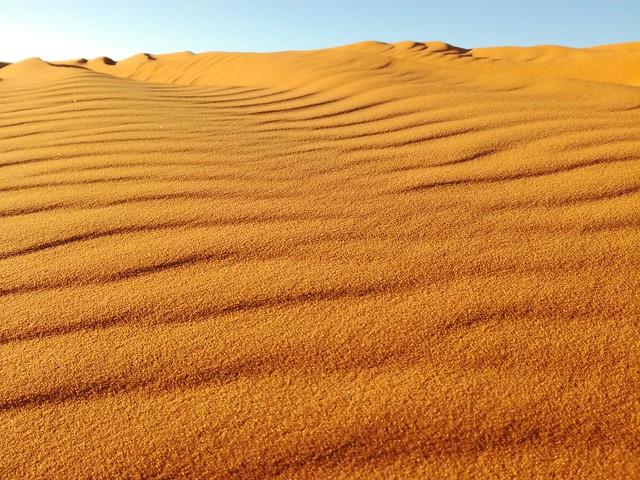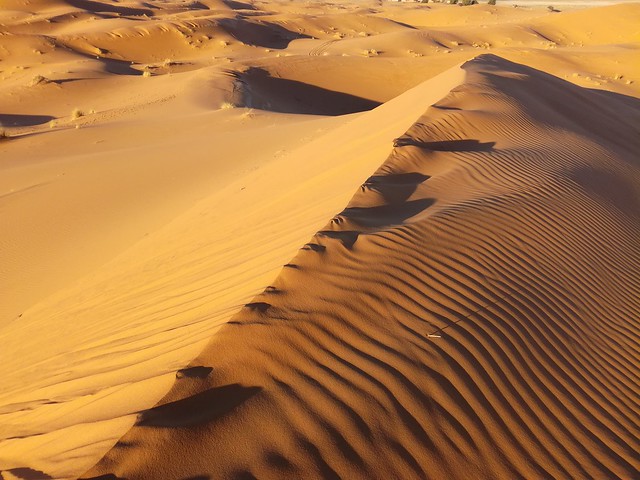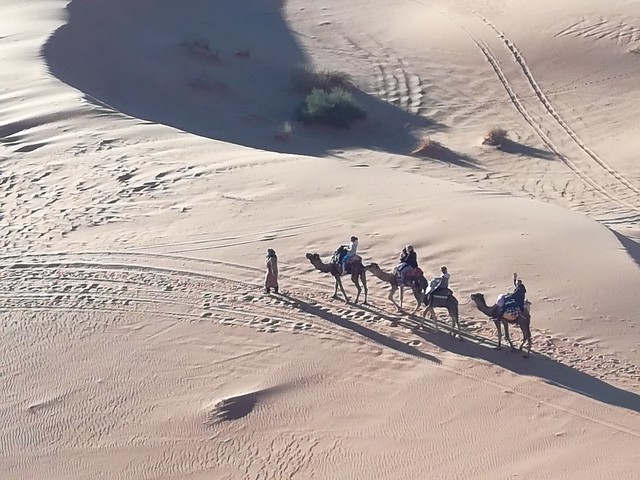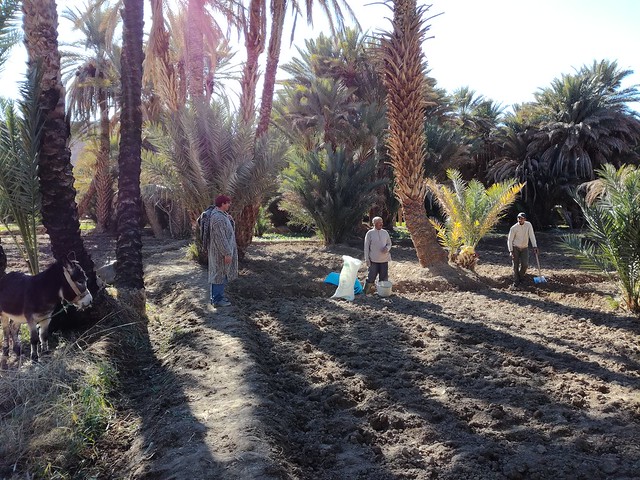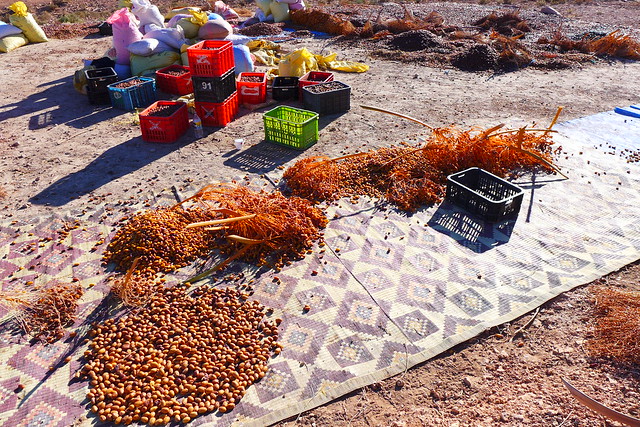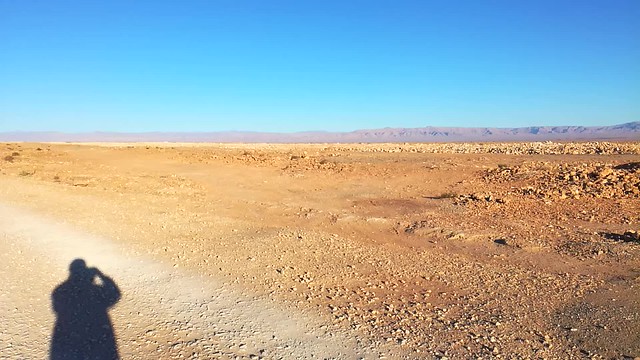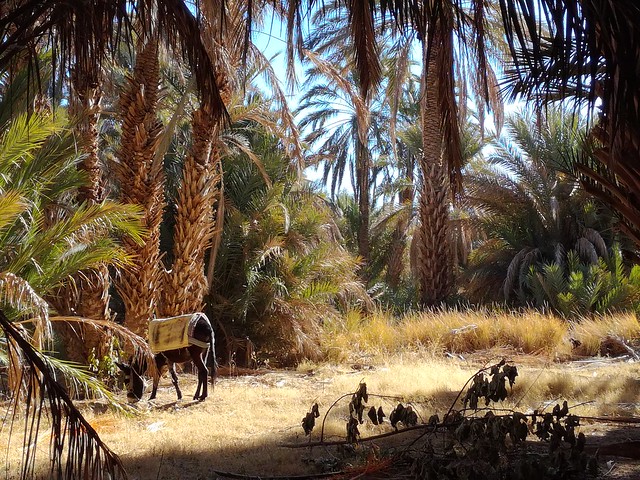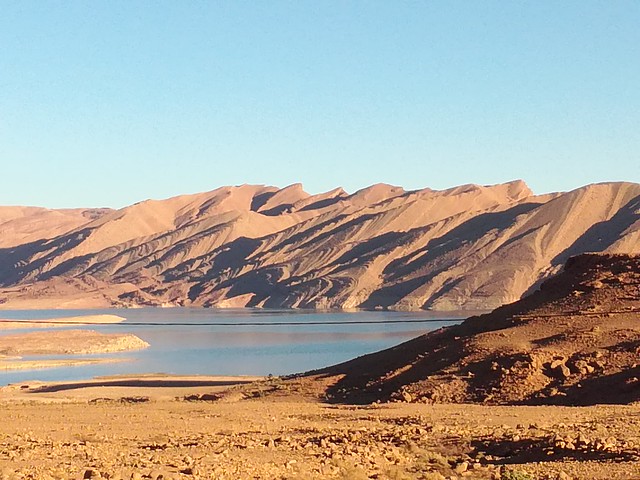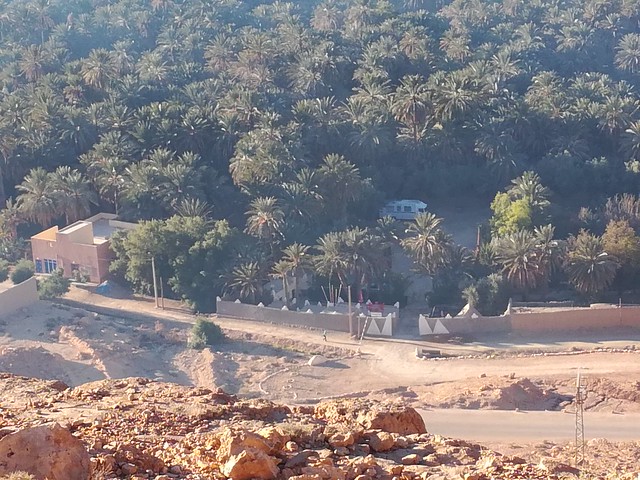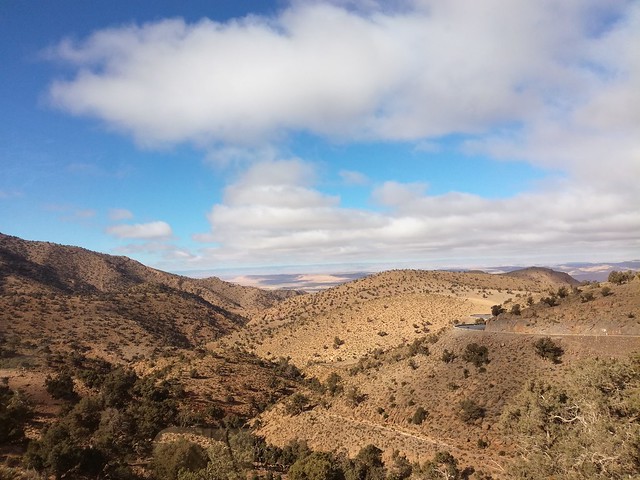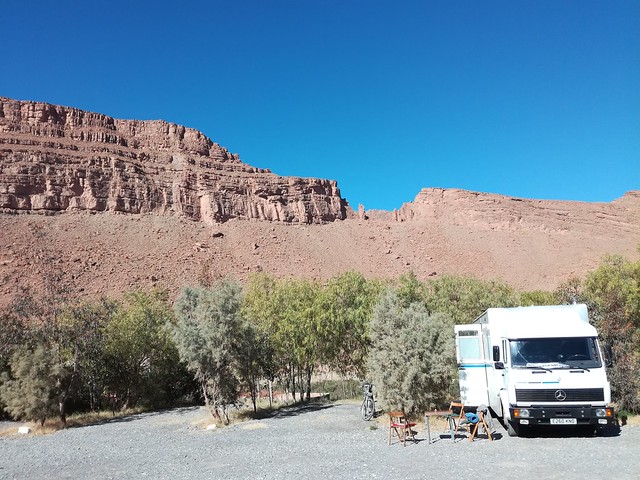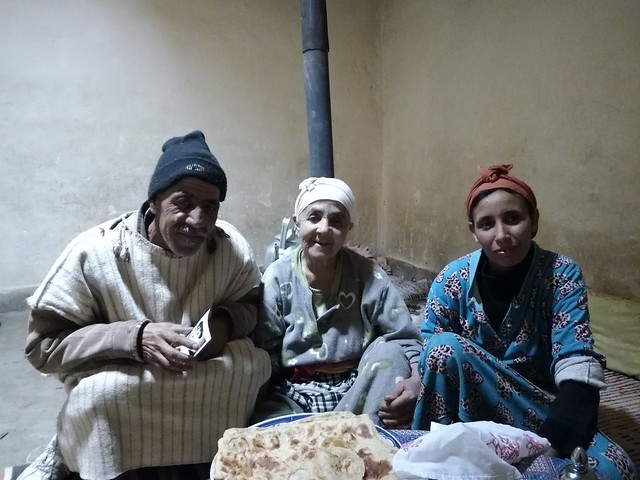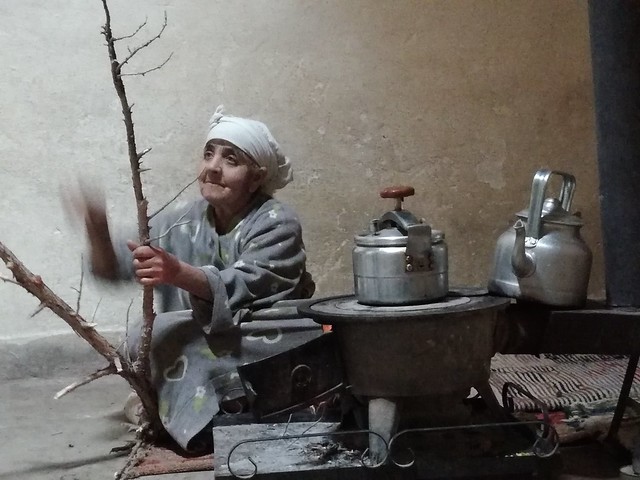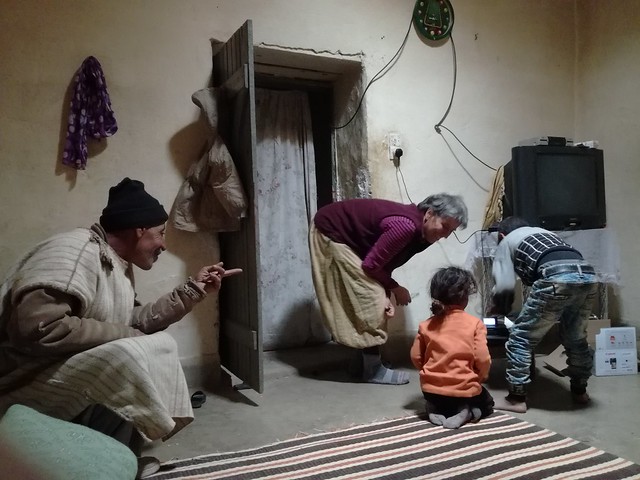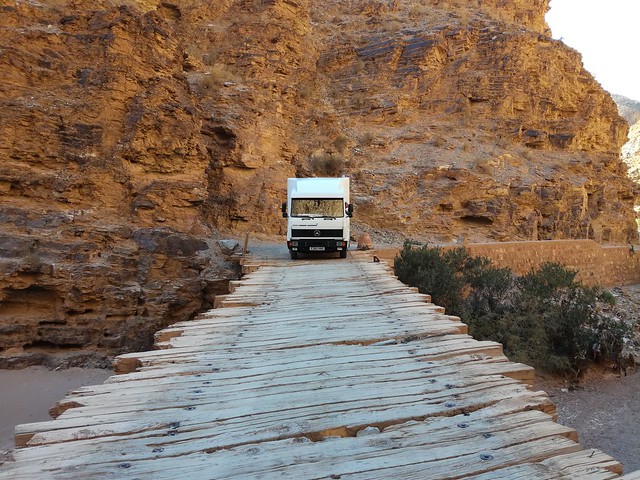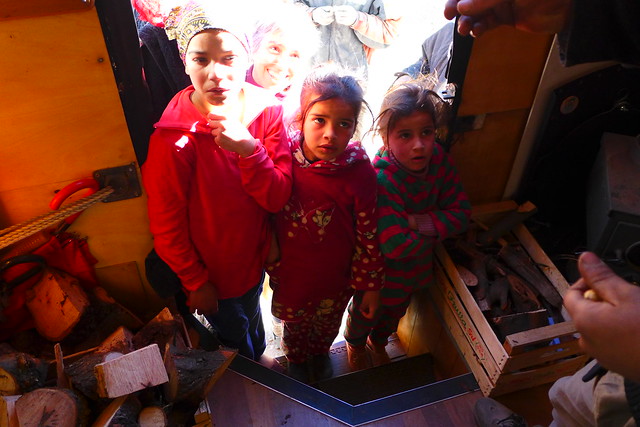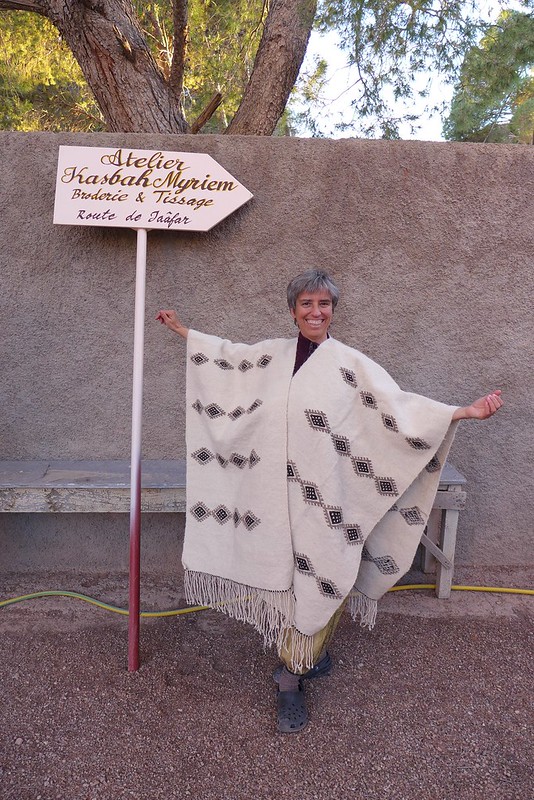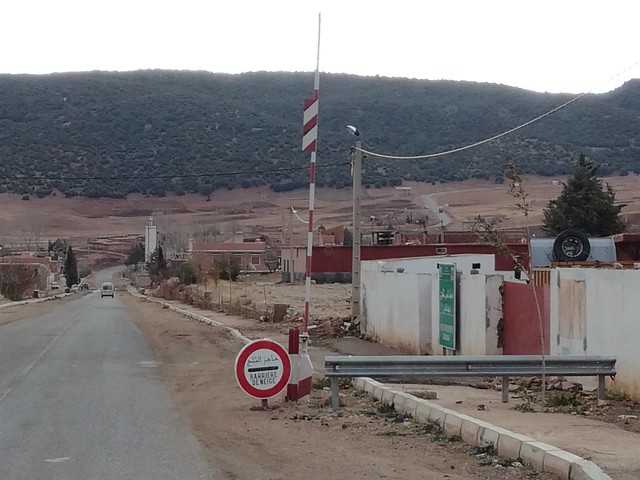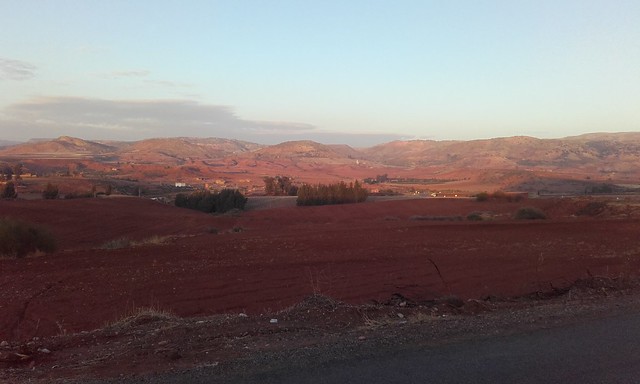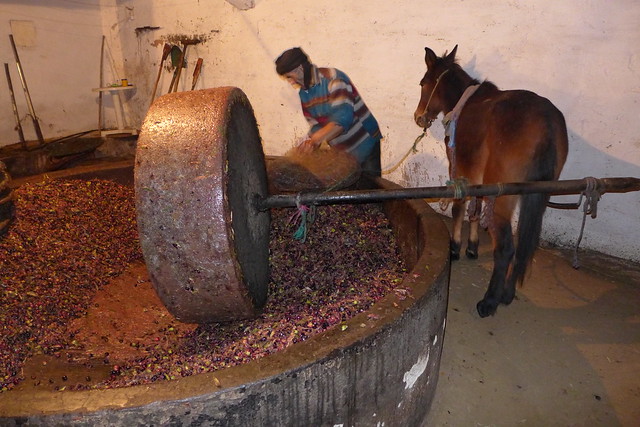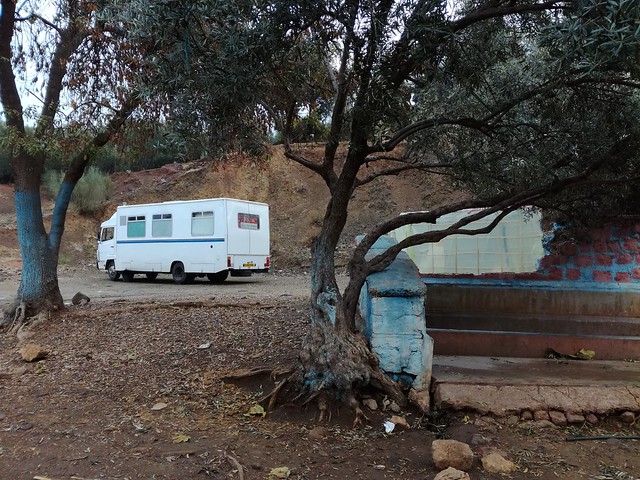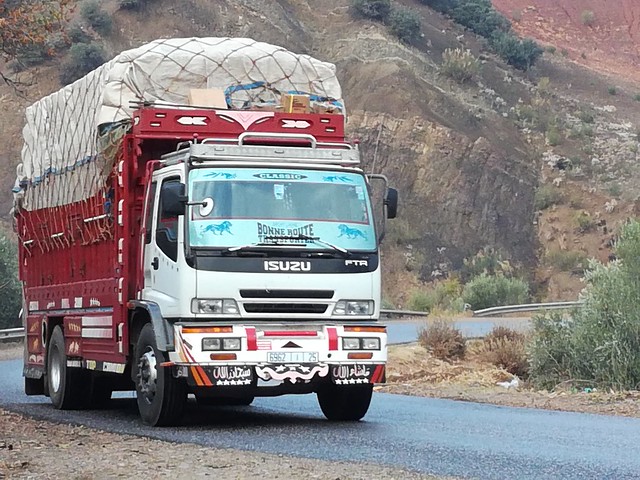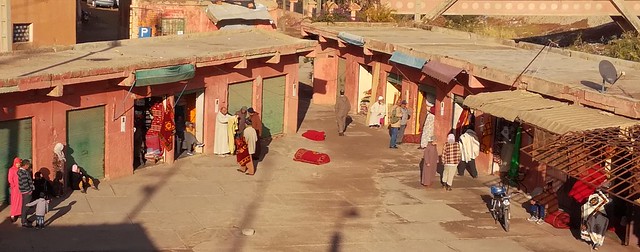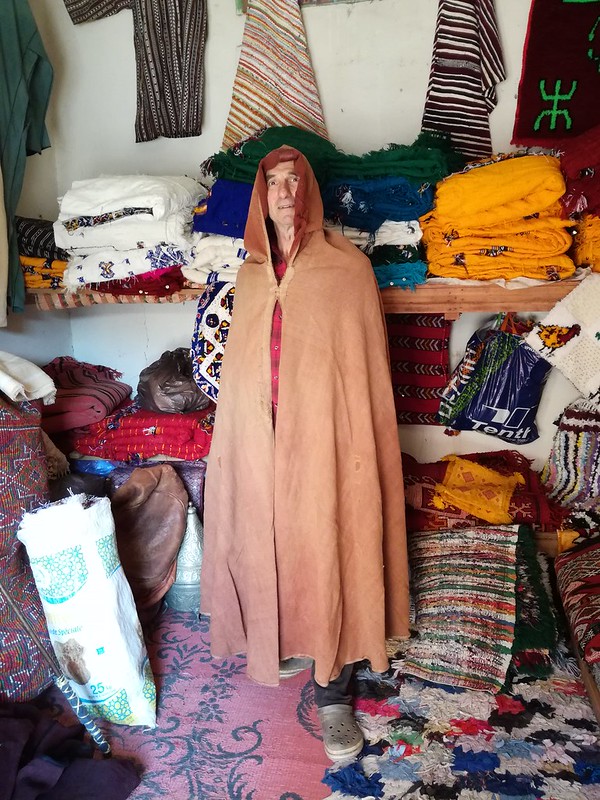Erg Chebbi
The Erg Chebbi desert is one of the top tourist attractions in the whole of Morocco, and although we generally avoid the tourist zones, we don’t want to miss out on this famous pile of sand. Luckily, most visitors flock to Merzouga, so we decide to give that little town a miss and instead try and find a quiet spot on the northern side of Erg Chebbi. We are on a piece of land, far away from any hotels or houses, just us and the sand dunes and a couple of other quiet campers, who we invite for a shared meal the first evening.
We’re up early the next morning, out to catch the sunrise and the changes of light on the sand. I am bowled over by the beauty of it all, the interplay of wind, sand, light and shadow that creates such beautiful images.
Later in the day, we meet Naji who takes us on camels to a little camp in the dunes where we stay the night, to experience the famous star-studded sky and the silence. On our way back out, we hook up with a French family who have stayed in a separate camp only a few hundred yards away from us, but hidden by the rolling dunes. Their father, Moroccan by birth, left for France as a young adult. Now he’s here, taking his wife and three children, none of whom speak Arabic, on a romantic trip into the desert. So why haven’t the children learnt their father tongue? The wife and children claim that the father didn’t want to speak Arabic with them. I wonder what is behind this… maybe the pain of moving from here where, as a young adult, he saw no prospects. Maybe he moved to Europe hoping that this would solve all his problems, only to be faced with a whole other set of problems. We talk to him about the emotional toll of leaving his family behind in Morocco when he came to France. Family here means a whole different thing than it does in Europe. It was hard being on my own, I worked and studied, I made my home there and created my own family but moving to Europe came at a price.
I wonder if speaking Arabic to his children early on would have opened too many painful memories. But maybe now the time is right for them to explore this part of their culture and have their father support them in it.
Back to the desert. I have fallen in love. There is not much to say, you have to go and experience it yourself. We will leave you with a whole lot of pictures that say (or should I say sing/dance?) more than words could do. They were mostly taken in the mornings, when the rising sun best illuminates the incredible, naturally sculpted landscape – light-shadow on wind-sand. Enjoy!
Click here to see the first lot of our desert photos
Posted in Uncategorizedwith 2 comments.
Getting lost in an Oasis
It is an extraordinary feeling to arrive from the harsh dusty desert plains and be enveloped by the gentle sounds, colours and smells of an Oasis. What must travellers on foot or donkey back feel when they arrive after hours or even days of thirsty travelling in the harsh sunlight…
It is exactly what we need right now, we’ve received various traumatic news from home and family in the last days, deaths, separation and a terrible accident, all in the space of a couple of weeks, each one of which has left us reeling.
There’s a soft knock on the door and a quiet voice – Ali offering us Berber tea. Apart from a couple of French shepherds we’d already met at a campsite in Fez and the Liverpudlian who quickly puts up his tent, there are not many people here.
We quickly fall asleep to the sound of water running through the channels of the Palm grove.
Over the next few days, we explore the Oasis – our first ever, and what a magical place it is! There is a softness in everything here, well-fed donkeys grazing peacefully, people working quietly in the fields, cutting, hewing and sowing, smoke from little fires drifting through the clearing, catching the sun and softening the view. We pick more dates from the ground than our bellies can hold, and when our pockets are full, we are offered more by the women who sift through the drying dates on large tarpaulins. They insist, so we fill the hoods of our jellabahs too.
We meet farmers and neighbours, we make friends with some of the other campers, and by the evening, we all share food in our van – a Tajine, some meat on BBQ sticks and a banana bread I made. It happens to be Christmas eve, but it suits us fine that no-one in our company feels the need to make any reference to it.
In the mornings, we take showers in the hammam-like rooms, with water heated by a woodstove. One early morning, I find a path marked by goatherds that leads up the cliffs, zigzagging between boulders and ducking under overhanging cliff edges. When I get to the top, the sun comes out. The view is stunning.
We visit one of the neighbours for Berber tea and exchange a jar of Frank’s orange marmalade and a pair of gloves, for a bottle of their home-made date syrup. Then we go and explore a majestic looking Kasbah in the next village.
A cycling trip to the surrounding villages on either side of the river, ends up in us getting lost in the Oasis and having to be rescued by a construction worker who shows us a way back across the river, involving a ‘bridge’ made of iron girders and thin strips of corrugated iron. We take our hearts and bikes into our hands and lift them across. Well, actually, the kind man who showed us the way (without whom we would never have found this bridge!) carried my bike across.
That morning I’d asked if I could go on a donkey ride through the Oasis, a suggestion that was met with various expressions, ranging from complete disbelief to outright merriment. There is no tourism here – for the locals of course a donkey is a work animal and nothing more. Who would want to just ride around the oasis on it???
Well, if we’d been on donkeys when we got lost, we could just have let go of the reins and slapped their buttocks and they would have taken us home, neither would they have had any trouble simply fording the many streams that were uncrossable with our bikes. I rest my case!
One day, the owner of the camp-site offers couscous for everyone, so we sit in the warm sunshine and share a delicious meal of couscous and chicken.
After a couple of days rest here, we are replenished and suitably calmed to strike out for further adventures. It is quite a wrench though, this place feels so safe and soft, it’s really hard to leave!
For more pictures of this chapter, click here
Posted in Uncategorizedwith comments disabled.
Approaching the desert
We’re packed up and ready to go but the family don’t want us to leave.
But why? They genuinely ask, as if something might have happened that made us unhappy here. And indeed, time could stand still and we could get involved with teaching English, learning how to cook Berber style and before we know it a month would be gone. But there is so much more to explore, so we say good-bye and travel on. We give a lift to a Liverpudlian who arrived a couple of nights before and with whom we’d also gone and explored the nearby open air thermal spring. The Ziz Gorge is in fact a long oasis, and the road winds alongside it for a while before lifting up along the side of the mountains, offering spectacular views before finally entering the next plateau.
We stop off at a supermarket in Errachidia, a town which seems to be full of schools, colleges and Universities, with young people everywhere, walking by the side of the road, sitting in parks and car parks, revising from sheets of paper. Maybe it is near exam time, or the education relies heavily on learning by rote. In any case, it seems that being outdoors is a more effective way of learning than sitting at home.
A boy approaches us asking for shoes, showing us his worn down sandals. We don’t have anything his size. When we come out of the Supermarket, I offer to share some food with him. He is grateful for one of our bananas and he lingers at a respectful distance while we stand outside the van, chatting with Gary, the Liverpudlian. I get a glass and share with the boy the buttermilk drink I’d just bought. He looks at me with grateful eyes. It must be difficult to be an early teenage boy with constant hunger pains. I give him some of our bread too.
It feels entirely different to be sharing food that we’ve just bought for ourselves, especially if we are eating/drinking it at the same time, instead of handing out ‘gifts’ in the form of cheap toys or sweets or pens and paper.
South of Errachidia, the landscape turns into desert. For a while, we drive past a series of villages, houses built of mud by dusty roads, and occasionally a well or a football field. Here too, people by the side of the road, waving, smiling, greeting us as we pass.
After a few kilometres, we are alone in the desert. Or so we think. Who knows, maybe there are still houses or tents, but we don’t see them. But appearances can deceive. Just when we think that we are surrounded by miles of desert, the road takes a turn to the left and drops sharply into a gorge full of palm trees as far as the eye can see. We have arrived at our next destination – Camping T’ssirt.
Posted in Uncategorizedwith comments disabled.
Hotel Jurassique
After Zebzat, we cross the Atlas Mountains, or what is the North eastern end of them. The road zigzags up for about 8km amongst rolling hills covered with rosemary before we arrive on another high plateau.
I am in need of a quiet space, somewhere to digest various bits of distressing news I have received in the last few days. We stop in the middle of nowhere so I can go for a walk into the desert landscape. But within three minutes of stopping, we are surrounded by an unruly bunch of feral kids, asking for money, clothes, food, toys etc. There is a tinge of menace in the air, something that could easily end with a stone being thrown at Emma. Instead of going for a walk, I try to engage with them, to catch their curiosity, by showing them how to juggle. Interestingly, the boys that were so cocky beforehand actually shrink back and it’s the girls who give it a try. One of them is pretty good.
But any genuine connection is quickly superseded by more demands. I take out a loaf of bread and some apples and make them wait until I have cut and arranged these nicely on a board and make them sit around me. But as soon as I give the go ahead, they just grab as many pieces as they can. I demand that everything be put back on the plate and we start again. The boys think it’s funny, the girls are a bit ashamed. This kind of crowd control takes energy and is the last thing we need right now, so we decide to drive on and go to a camp-site.
The Jurassic Hotel/Camping lies at the mouth of the Ziz Gorge and is run by Said, a member of a large Berber family (they are over 100 when they meet for family gatherings). His wife and daughter-in-law run the kitchen with the help of young Mohammed, training to be a chef. We spend a few nights here, making friends with the family, with Frank catching glimpses of the local Berber cuisine whilst teaching Mohammed English. He dreams of moving to Europe and we try to give him a more realistic picture of what kind of life he could expect there. Essentially, we encourage him to go travelling to broaden his horizons but try to dissuade him from thinking of Europe as his new home. There is so much to do here and Morocco needs to keep its young and motivated people.
The Ziz gorge is absolutely stunning. The river has dug deep into the high plain and by the Jurassic Hotel, it makes a large bend, giving you the impression that you are at the bottom of a circular valley. One day, I’d like to hire a donkey to go for a ride through an Oasis, but maybe not today, we are quite tired and need some down time.
We walk along the river-bank foraging for wood, but there’s not a branch to be found. However, coming back to the hotel, we spot quite a lot by the wayside. Wood seems to be in short supply here, every little bit is spoken for, so we ask Said before taking any, and he is very generous and lets us stock up our reserves.
The nights get bitterly cold here – don’t be fooled by the sunny daytime pictures!
We make friends with Said’s brother Hussaine, who tells us interesting stories about local folks and customs. He explains to us his partridge trap, which involves a process of tempting the birds with grain, placed in strategic places over a number of days, until the birds feel safe. He then arranges a funnel-shaped net near the feeding place and lies in wait. When the birds come to feed, he takes a couple of stones and makes a tiny noise, just enough to make the birds a little nervous and move away from the noise, but into the trap. He says that on good days he may catch 15 in one go!
We speak a lot about the challenges facing the younger generation in Morocco. I ask if young people have a choice in who they want to marry or if it’s all arranged by the family. Yes, these days, someone might choose a partner and then get his family to ask the other family’s approval. A man has to prove that he can provide for his new wife and he has to pay for everything, the wedding, furnishing the new apartment etc. To make the marriage legal, he also has to pay the parents of the bride a certain sum, it may not be much, could even be as low as a few Dirham, but it is essential in order to legalise the marriage.
Hussaine tells us that not far from here there is a town where every year in September there is a marriage festival. A marriage may be agreed upon at any time in the year, but often the families wait until the festival to get married. It is a matter of convenience – here, everything is in one place; the registrar and whatever person or institution is needed to create the right documents. Since one would need to see the same authorities for a divorce, they also happen during the marriage festival, and they too may have been agreed upon any time during the year but only acted upon during September. This festival must be quite something to watch.
****************************
A few more pictures about this chapter can be found here
Posted in Uncategorizedwith comments disabled.
Arhoussaine and his Family
We stop outside a school in a tiny village called Zebzat. As I step out to search for a parking place, I meet Arhoussaine who has his family home just behind the school. He invites us to park outside his house and insists we come in for a cup of tea. Frank has cooked a meal in the morning, a big pot of stew with ingredients from northern Spain, so we suggest the whole family may want to come and eat with us. Then we realise it’s got pork in it, so we have to undo our invitation – how embarrassing! But they take it with a gentle smile.
We find out that Arhussaine has studied and speaks a number of languages. Not being able to find work as a teacher, he became a lorry driver and for many years transported all sorts of stuff all across Europe.
His children, 4 and 7 years old, like so many children here look alert and bright and are a delight to be with. We show pictures we have on our phones, of Morocco’s beautiful landscape. We get some paper from the van and make origami shapes of birds and boats, a great way of making contact, as they can try and guess at every fold, what it’s going to be. I show the boy how to fold a boat. It’s very easy to do without any language, so this will definitely become part of what wed can do with other children we meet. A piece of wool I’ve had in my pocket since our visit to the cooperative quickly gets turned into a little person, some sticks from the fire- place turn into oars, and we have a little rowing boat.
The room has a few carpets and they bring in a mattress for us to sit on. There’s a television in one corner and a stove in the middle, nothing else. But despite the sparse furnishings (or maybe because of it???), there is such warmth, not just from the stove that is chucking out heat but from the people themselves. The grandmother speaks Berber and just a little Arabic, but nevertheless, we communicate, by touch, by eye contact and with the help of her son’s translations.
Unusually, they allow us to take photos. So here are some rare, precious pictures that capture the special feeling we experience of family life in Morocco.
Next morning, they invite us for breakfast and we hit on the idea of bringing in our little portable printer, so we can leave them some of the photos we took. They are fascinated by the printing process and delighted to be able to keep the pictures.
As we drive off, we feel like we are leaving home. There is such a strong sense of family and belonging in that house, and they allowed us to share it for a little while. It makes me reflect on my life choices, of moving to another country in my early adult years, of building a new home and family in Totnes, of once again now being on the road, travelling. Also the choices my children made to move away from their birth town to big cities. There are times, especially when life has thrown a spanner in the works, when I acutely feel the physical distance between us and our loved ones, all of us spread out across different countries. Thankfully the internet makes it possible to be in touch much more than was the case when I left Germany almost 30 years ago.
****************************
For photos of this chapter, click here
Posted in Uncategorizedwith comments disabled.
Midelt and Aouli
We get to Ali’s house after dark, but nevertheless, his wife starts to cook and produces a delicious tagine with fish balls and a red spicy sauce.
We spend time together, looking at photos of Ali’s youth and hearing about their family life.
Next morning, Ali takes us to the Kasbah of Midelt before he has to go to work. When we return to his house, his wife insists we come in for breakfast, and this way, we meet her mother and sister. We spend a hilarious morning, the women being much freer now that the man is out of the house. Frank, being a foreigner somehow doesn’t seem to stem the flow of their jokes. When we say good bye, we feel full of delicious food as well as laughter and joy de vivre.
Our next adventure is an excursion to a disused mine about 25 km North-East of Midelt. This trip lasts most of the day and is a journey into the ‘Wild West’, crossing many brooks and some rickety bridges.
Although officially abandoned, people still harvest the disused mines for precious stones and lead, going down with no breathing apparatus and coming back coughing, their hands blackened and deformed from the hard work. They would like to take us down there, but I have absolutely no interest, and even Frank graciously declines. We carry on, winding our way down into what looks like a godforsaken valley, truly beautiful rugged rocks and a tiny trickle of a stream, every now and then a donkey, hobbled, with no sign of its owner. At some point, we are overtaken by a man on a moped. It turns out he is the head of the village above the abandoned mine, and he invites us for a cup of tea when we get there. Then he pootles off.
We meet the guardian of the abandoned village and his delightful children.
I make a connection to the girls by offering to fetch water with them. We climb across a wall and scramble down the banks, and there, in the dry river bed, they show me where they collect water from a source. They fill their 10 litre canister with a simple system: a bottle is cut in half, the top half, upside down and with a cloth in it, acting as a funnel and filter into the canister, while the bottom half is used to scoop the water from the shallow puddle of spring water.
By the time we climb back up the river bank and heave the canisters across the wall, we’ve made friends enough for them to look into our van and invite us into their house.
But Frank and I want to go to the upper village for our cup of tea, so we decline the offer and rumble on, up a gravel road. We first miss the turn-off and instead end up on top of the hill, near a quarry, with stunning views and the realisation that we need to somehow turn around and come back. We then take the correct turnoff, only to be halted by a digger in the middle of the road. It looks like it’s been there a while already; car tracks show that it’s been circumvented for a few weeks at least. We turn around to go back when the village elder arrives on his moped. But no amount of persuasion on his part will turn Emma into a 4×4, so we accept defeat and turn back.
In Midelt, we stop at a garage to refuel, grease Emma’s nipples and while we’re at it also check the tyre pressure. A faulty pressure gauge in one garage results in deflating rather than inflating one tyre, but luckily, there is another garage next door where a young man called Said is able to help. He tells us about his sister who lives in Plymouth and invites us to her house on our return to the UK (from then on, he occasionally rings us to make sure we are alright. He’s one of four ‘guardians’ we have accrued so far).
Darkness has settled in but still we would like to move further south, even if only to the next village.
****************
There are a lot of pictures of the stunning countryside of Aouli, the abandoned mining village, plus some of the Kasbah in Midelt. Click here for the photos
Posted in Uncategorizedwith comments disabled.
Monsieur Ali
We were told by Ibrahim, a friendly policeman in Khenifra, that when in Midelt, we should go to the Restaurant Le Pin and ask for ‘Ali’. The restaurant is hard to miss, situated as it is, by the side of the N13, one of the few major roads that go north to south through the Atlas Mountains. Midelt is one of the towns (or should I say cities) that seem to have planned for expansion. There still is an old, rickety town centre, but a large and spacious road runs through it, as if in the next 20 years, it will radically change and the planners knew this when they enlarged the road. Apparently around 30% of Moroccans currently are under the age of 15. Schools abound, and when you look at the children, you see a lot of bright eyes and sharp minds, and they have a good energy. This country is probably going to change fundamentally in the next 20 years, and I sincerely hope that the young generation will put their minds to tackling the difficult issues of water shortage and pollution in a way that benefits the country as a whole, not just a few people.
We enter the complex of restaurants and little courtyards that is Le Pin, but before we can even ask for Ali, he’s by our side and welcomes us. He speaks several languages and, in our case, would love to practise his English. We have an intriguing lunch, where the first course consists of a philosophical question: ‘What is the Aim of Travelling? And we meet each subsequent encounter with Ali by plying him with another answer:
– To be able to come back home
– To broaden one’s horizon
– To promote peace by personally meeting people and thus reducing prejudice
– To exchange ideas and goods
– To learn another language
His answer is that by learning about another culture you learn something about yourself.
Ali suggests a few things to see in Midelt and decides he’s going to take us there after we’ve had our lunchtime nap.
About 4pm, we take Emma along some fairly narrow back roads to get to the Atelier Kasbah Myriem, a cooperative set up by nuns to support Berber crafts, particularly weaving. A lovely woman opens the door to the show rooms, displaying woven goods and tapestry as well as embroidered work – table-cloths, napkins etc. The work is exquisite and also quite expensive by comparison with prices we have seen in Morocco, more in keeping with what they would cost in Europe. We keep reiterating that we neither have a lot of money nor the space in our van to take anything with us. It is very interesting though to see the beautiful, high quality designs and produce. I particularly take a shine to a beautiful poncho-like woolen garment, which they allow me to model.
We postpone Ali’s further plans in favour of meeting his family… it’s getting dark and he wants to buy fish to take home. Frank and Ali go off while I stay with the van which is not quite legally parked on the main street. While they have their 10 minute adventure of getting fish and fire wood, I have four separate offers through the side window, ranging from a guided fossil tour to the mines, to a 10,000 Dirham note, planted by hand against the window – I’m not sure if this was meant to be in exchange for foreign money, my services or indeed our Emma!
******************
For some photos of this chapter, click here
Posted in Uncategorizedwith comments disabled.
Foreigners and Locals
It’s time to move on South – we don’t want to get stuck north of the Atlas mountains… we pass a number of snow barriers, reassuringly they are all still open.
It’s also time to search out another camp site – our laundry basket is overflowing and we’re yearning for a hot shower… about midday, we turn into one just north of Midelt. For a couple of hours, we are the only ones on a site that could probably cater for in excess of 50 vehicles, but soon enough a large red lorry rolls up. On the side it says ‘aide humanitaire’. This is a French couple from Perpignan who run a little charity bringing things to Morocco – second hand clothes, shoes, bicycles… whatever has lost its usefulness in the richer Europe but could still be useful or appreciated in Morocco. For the last decade or two, this couple have been to-ing and fro-ing from Perpignan to Morocco about 6 times per year, filling up their lorry in France, distributing it all over Morocco, returning to refill and set out again. They supply schools, villages, or even just people in need by the side of the road. On the surface you’d think what a good idea, rather than throwing things away, to give them a second life where they are appreciated. Underlying this, I have a distinctly uneasy feeling but can’t quite put my finger on it yet. I don’t particularly take to the man who proceeds to walk around inspecting the camp-site, bemoaning the low-hanging branches of trees that might scratch the side of campervans. He seems to be part of an internet site for campers and his word counts, so next day, there are people up on ladders cutting branches. It makes me realise just how vulnerable to negative online comments these places are. In the afternoon, we take a stroll out the back door of the compound, and in our in search of an advertised Eco Park, we come across a very well restored house. We ask for directions to the lake and instead get invited in for a meal. A French guy who runs a 4×4 business (tour guide and repairs etc.) and his Moroccan wife, plus a few French and Moroccan friends are sitting around a table. My French is not completely fluent, so some of the conversation goes over my head, but despite their cordial hospitality and provision of food I don’t feel at ease in this house – it feels somehow colonial. Maybe I’m just feeling uneasy today.
In the evenings we treat ourselves to a meal at the restaurant and we bump into Jacqui and Brandon, two American travellers. They are heading in the opposite direction to us and their stories are quite different to ours. Brandon expresses a frustration with the pushy nature of people (including little children) wanting things from you, and how this gets in the way of making genuine connections. They say they have searched but somehow not found a way into the gentle, welcoming nature of the people here and have instead felt they’ve had to be constantly on their guard, fending off people’s persistent demands.
We compare experiences and try to figure out whether it’s about the different regions we have respectively traveled through, or whether we act in different ways: it seems there is a direct correlation to the amount of tourism in a region.
Later that night, my thoughts turn this over and over. What do we do to people when we just come along and ‘dispense’ stuff – balls, pencils, chocolate, beer, whatever, whilst at the same time they see our possessions inside the vehicle – bikes, binoculars, warm clothes etc. What happens when we just randomly give, without first establishing some kind of relationship that is free from demands, without some sort of human to human exchange, on an equal level? Again and again we see that those who are free of the desire to just get things out of us are proud, rich people (no matter whether they are materially rich or poor), people who feel that they have at least as much to give as they might receive from us.
We are able to meet freely, to learn from each other and to give to each other. That feels very different. By the same token, I find that every time I give something in a situation of demand, I am reinforcing this inequality, the sense that ‘they’ are poor and ‘we’ are rich by comparison. But how does one step out of that dynamic? We managed to do so in the school up in the forest, by giving children the idea of making their own balls and teaching them how to juggle, but how about the person who flags us down by the road side just outside of a city? How about the hungry/thirsty woman with a baby? Or the 7 school children in a deserted valley who get quite cocky with their demands? Each situation seems to demand a new tactic, a new ploy, to bypass the ‘gimme-gimme’ and to reach for the real person behind it. This can be quite exhausting, especially those times when you’ve spent 5 minutes in a seemingly nice conversation only to realize where it’s actually headed. However, I have to emphasize that we haven’t experienced much of this so far. If I have to put a percentage, I’d say 5% only of our interactions have needed that creative steering. However, I’m worried that we may get more practice, as we are about to head into more touristic areas.
For some photos of the landscape we traveled through on this day, click here
Posted in Uncategorizedwith comments disabled.
The smell of freshly milled Olives
We leave Khenifra mid-afternoon. Once again, the landscape changes drastically, the fading daylight is incredible as we dive from a higher plain down into another world: We are quite speechless as we pass red, red hills as far as the eye can see. Rich, red earth, just like the one or two hills on the way out from Totnes to Torquay in Devon, but on a much larger scale and obviously with a different vegetation.
Houses made from the earth duck into the side of the hill, camouflaged almost to invisibility if it weren’t for the washing flapping in the wind.
About 5 km from Khenifra, we turn off onto a smaller road that winds itself through this landscape. On one particularly steep bend, there is a water fountain, and as we later discover, an olive mill where two men lead a mule around the millstone, grinding a whole lot of olives to a pulp. The smell of freshly ground olives reaches across the road and draws us into the mill. We stay there for a while, chatting and sampling the oil and buying a couple of litres. By the time we come back out it is dark. The men assure us that it is safe to stay the night here.
It may be safe, but it’s quite a noisy stopover. All through the night, heavy lorries rumble past us on what we thought was a little road. At one point, having been woken by yet another rumbling engine, it occurs to me that maybe they know something about the weather we don’t. We still need to get across the Atlas mountains, before they get blocked by snow! So far, the snow barriers are all up, but who knows, this might change from one minute to the next… I try to connect to the internet to check the weather forecast, but we are deep in a red earth fold where no signals reach. But now I’m awake, I get up, potter around a bit, light a fire, do some cleaning, waiting for sleep to return to my mind and limbs.
The next morning, we hear from the men by the mill that there will be at least two weeks of sunshine. They also voice their concern that they saw a light in our van at 4am – was everything ok? Are we alright? I tell you, in Morocco, the night has a thousand eyes, nothing goes by unnoticed!
I go to pick up some water from the fountain and meet two young girls. The older one immediately stops filling her own bottle and takes mine to fill. I try to chat with them in Arabic, and they respond with a delightful mixture of shyness about being talked to by a foreigner and hilarity about my terrible pronunciation :-). Later the whole family is there and I ask the older girl for her name attempting to write it on my notepad. I show it to the family – is that right? Yes, they all nod appreciatively, until with a certain hesitation about contradicting the adults around her, the girl shakes her head and corrects my spelling. Even after a couple of week’s immersion, I can’t hear the difference between some of the Arabic letters, in this case the ‘s’, of which there are two and I keep mixing them up. The children go to school, but many of the adults do not read.
For more photos of this chapter, click here
Posted in Uncategorizedwith 2 comments.
Khenifra’s Souq de Tapis
A combination of Google maps and intelligent guessing has so far kept us out of tight spots in cities, but this time, I miss a turn and we head right into the old part of town, where a souq is blocking the road. However, a few turns around tight bends send us back out of it and we park by a bridge and walk instead. Maroc Telecom doesn’t open until 3pm and we have an hour spare to visit the market. We buy some food and amble back. This is when we come across the Carpet Souq. Two minutes of watching it, I feel I have to leave. The way it’s run breaks my heart. Lots of people sitting and watching, and a few older guys walking around with carpets on their shoulders, calling out a price in passing. Next round, the price has sunk down, and still no-one wants the carpet. And so on. I think of the smiling Tamazirgh woman up in the hills weaving her carpet and it breaks my heart to think that this is where it might end up, being sold to the lowest bidder. It feels such a hard and exposed reality. I tug Frank by the sleeve of his Djellaba, let’s go. We walk around the building and up onto the bridge. From here, we have an overview of the market. The same guys are still walking about with their wares, sometimes stopping to unfold the carpet or blanket to show it to someone, then moving on. Frank is fascinated, so we stay and watch for a while, not really understanding how it all works. After about 5 minutes, we ask a passer-by to explain the system to us. It turns out that the guys walking around are not the producers or their family, but they are employed to display the carpets, and the price does not lower but rise – it’s like an auction. That puts an entirely different light on it. Now I want to go and watch it all at closer quarters. We go round the back to where we saw some carpet shops, and we find a guy who explains in more detail what’s happening, all the while he’s keeping an eye on what is being carried past his shop. Sometimes he gets engaged, sometimes he declines without even looking at the produce. He bought an old Djellaba that we’d seen displayed when we watched from the bridge. We ask how much it costs but instead of giving us a price he just says it’s very old and very good material. Frank tries it on. Older than my husband? I ask. Yes, much older.
For more photos of this chapter, click here
Posted in Uncategorizedwith 2 comments.
